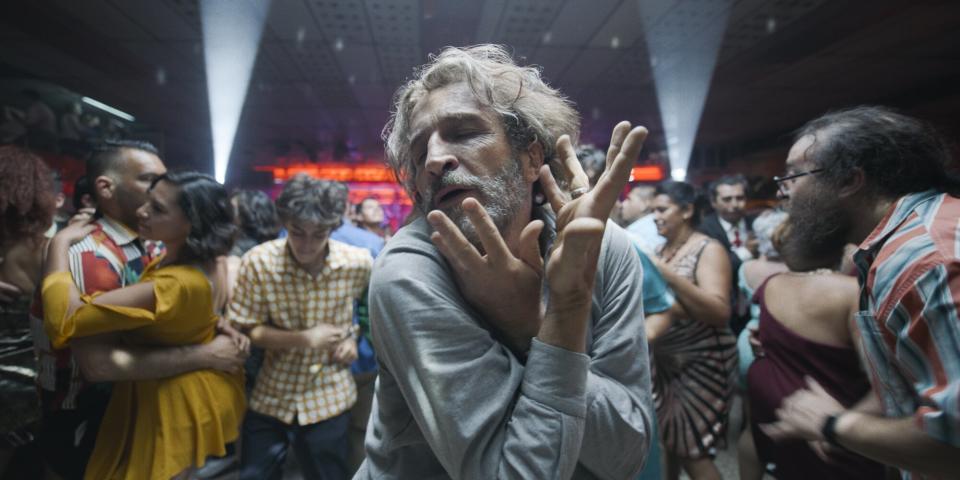Bardo review: Welcome to the movie-memoir Thunderdome
There's an animal called an axolotl that appears throughout Bardo, a slippery little amphibian whose existence — neither a fish nor a lizard, with its translucent salamander body, brightly frilled gills, and fat dorsal fin — seems like a Darwinian trick. Like writer-director Alejandro González Iñárritu, the axolotl is also native to Mexico City, and its liminal state very much reflects both the form and content of his latest. Taken from the Tibetan term for the place between life and death, Bardo (subtitled, with a disorienting wink, False Chronicle of a Handful of Truths) is a movie about a man who is and isn't Iñárritu, done in a style so extravagantly crowded with images and ideas that it feels less like storytelling in any traditional sense than some surreal self-refracting hybrid: memory palace, midlife crisis, memento mori.
Bardo (in limited release this Friday and on Netflix Dec. 16) marks the filmmaker's first production since The Revenant took home three Oscars, including Best Actor and Best Director, in 2016, and his first return to Mexico on screen since his lauded 2000 debut, Amores Perros. His cinematic stand-in here, though, Silverio Gama (Zama's Daniel Giménez Cacho), is not quite the Hollywood player his creator is; he's more of an activist-journalist type, a "documentarian slash artist" who tells stories on both sides of the border that are generally well received, if not showered in gold and DiCaprio-size accolades. He's also terribly conflicted, racked by the creeping fear he's a fiftysomething hack who has tried and failed to serve two masters, or that at least that's what his peers and friends — which is to say, his greatest enemies — believe.

Limbo Films, S. De R.L. de C.V. Courtesy of Netflix
"Success has been my biggest failure," Silverio insists mournfully, though he's about to receive an honorary prize for his work, and has a lovely if sometimes fractious family: his love-goddess wife Lucia (Griselda Siciliani), grown daughter Camila (Ximena Lamadrid), and a teenage son, Lorenzo (Iker Sanchez Solano). There was another baby once, a little boy who didn't live long outside the womb, and Iñárritu turns his birth into an outlandish tragicomic metaphor, complete with thighs'-eye camera angles and a bloody umbilical cord that snakes along a hospital hallway like a downed power line. It's the kind of scene that asks, "Are you up for this?" — an early pressure test for the many Fellini-esque set pieces on deck, loosely gathered into movie form. (Several critics responded with a resounding no; following a divisive festival debut late this summer, the movie's runtime has been trimmed of 22 minutes, bringing it down to a still-monumental 159).
What follows, unsurprisingly, is a maximalist trip: a psychedelic Tilt-a-Whirl that skitters from bourgeois Los Angeles to the beaches, television studios, and social clubs of Mexico City and the dusty migrant-dotted hinterlands in between. Bewigged soldiers face off in a pantomimed war like escapees from a demented penny opera; plumed showgirls twirl across a soundstage, a flock of beautiful human flamingos trailing sex and glitter; a California commuter train becomes a sloshing aquarium. David Bowie, majestically a cappella, is used as a needle drop in a way that for once feels earned, and not just because Netflix can afford it. Extras pile on as if the hazards of pandemic shooting never happened — in street scenes, on dance floors, and even atop a monument of naked flesh that Silverio climbs like an anxious conquistador, only to meet a real (imagined) one at the top, the breezy manifestation of Hernán Cortés.
The maker of films like Birdman and Babel and 21 Grams is not known for his brevity or self-restraint, and there's a lot here that feels frankly indulgent, even obtusely so. Silverio, played by the lithe, wild-haired Cacho with jittery leonine flare, is a familiar iteration on a certain type, The Great Man Who Doubts Himself. As he continually questions his art, his relationships, and even his reason for being, the movie responds in kind, giving one supporting character a long monologue midway through that colorfully and ruthlessly decimates everything Silverio is about — our hapless hero's worst fears, casually manifested at a cocktail party. But it also gives him endless chances to be centered and redeemed, held up to the light from every angle like an egoistic jewel.
The sheer grand scale and layer-cake meta-ness of Bardo — at certain points it feels as if the camera might actually cut to a spinning top, á la Inception — puts the movie in a category somewhere apart from other recent memoir auteur projects like Roma, The Hand of God, the Souvenir series, or Licorice Pizza. (Even Steven Spielberg joins the fray this December with his own autofiction, The Fabelmans). The heights of self-regard here feel like both a feature and a bug, an earnest dispatch from a febrile and wildly fertile mind that doesn't always distinguish between artistry and uncut narcissism. (Ironically, streaming on a platform like Netflix will grant Bardo both an incalculably huge audience for an arthouse film, and one so fractured and distractible it may consume the movie in whatever bite-size pieces it wishes; the viewer has become the master.)
As an all-in-one viewing experience, Bardo is undeniably uneven, often maddening, and seems to have approximately 17 endings. Still, the movie is a marvel in its own way, dotted with pure cinephile delights and small unexpected pockets of profundity: a flawed but frequently dazzling monument to big-swing filmmaking in an era of relentlessly bland franchises and IP, as bold and strange and somehow true to life, in the end, as anything. Grade: B
Related content:
International Oscars: The 10 best foreign-language films to watch before this year's ceremony
Alejandro González Iñárritu: There's a 'racist undercurrent' among critics of his latest film Bardo
Awards season calendar 2022-2023: See dates for Oscars, Golden Globes, more
Armageddon Time's James Gray: 'Cinema may not be here forever'

